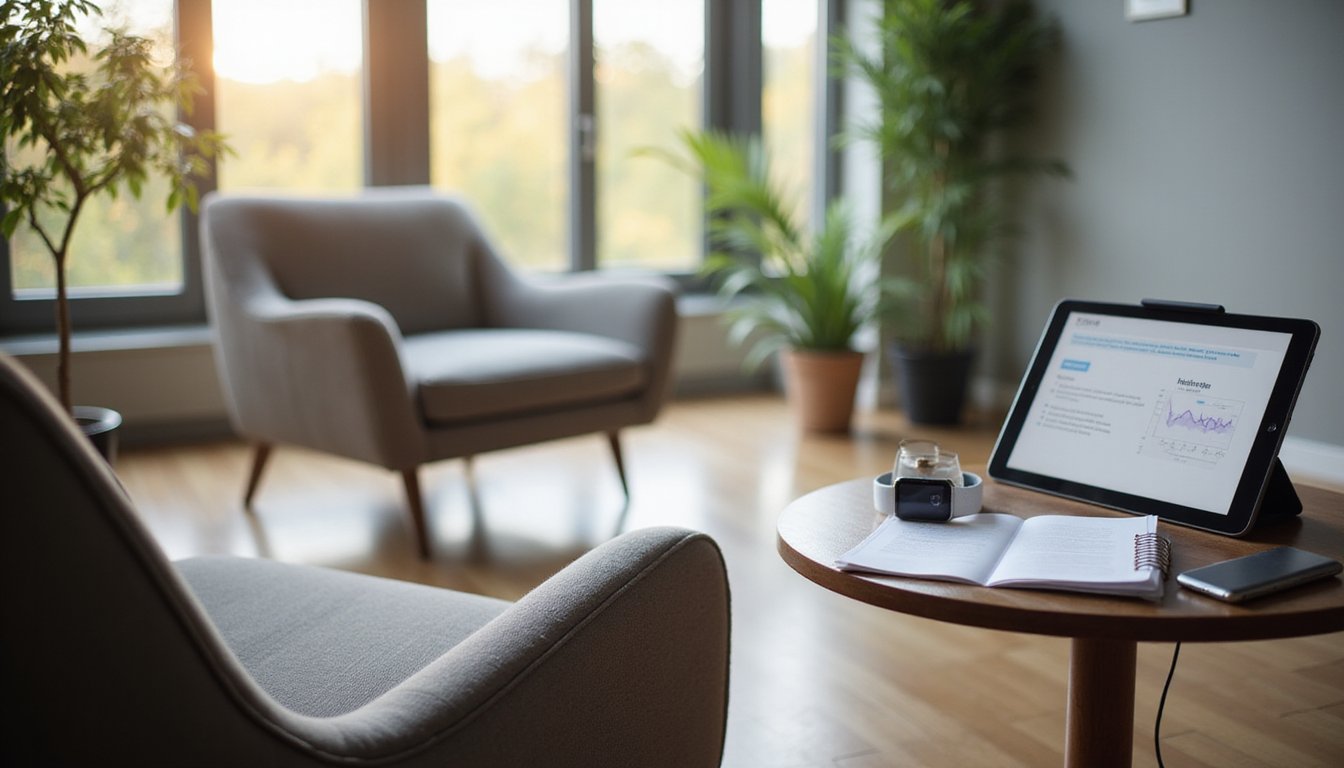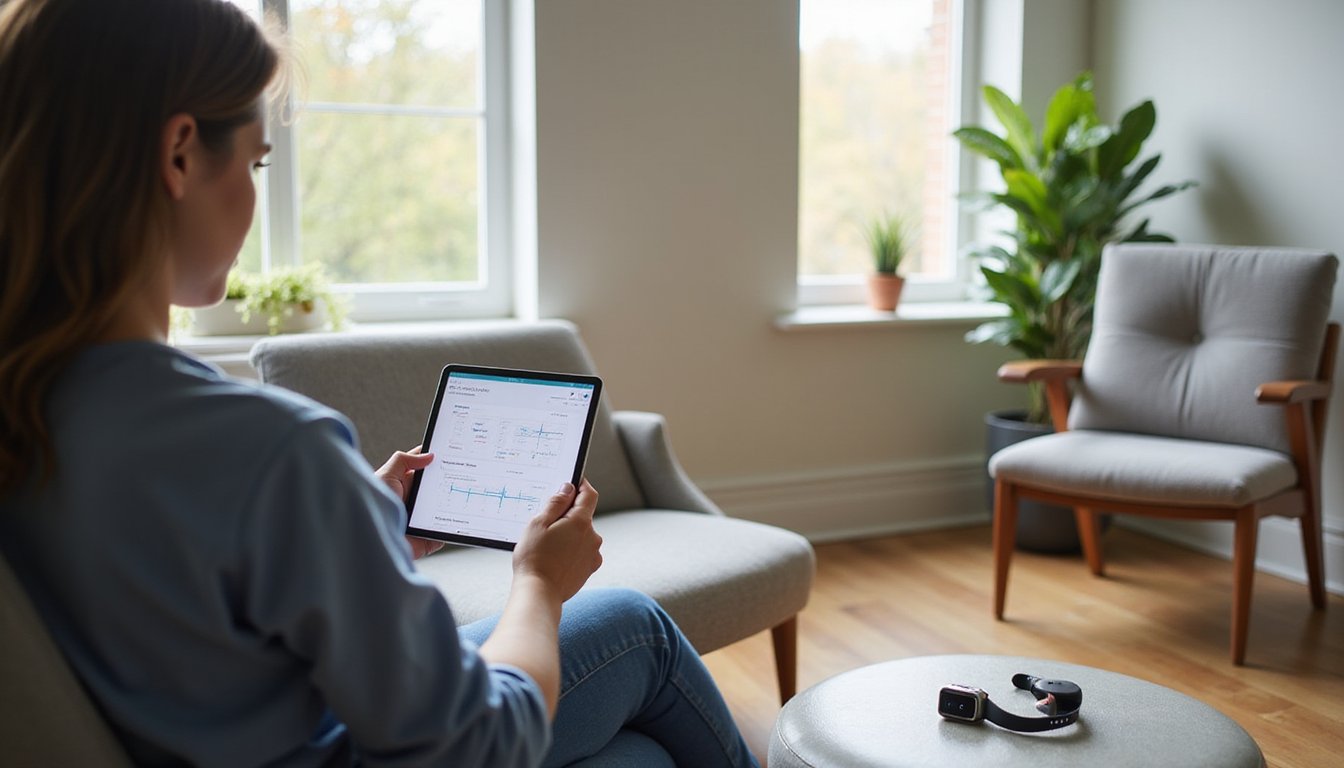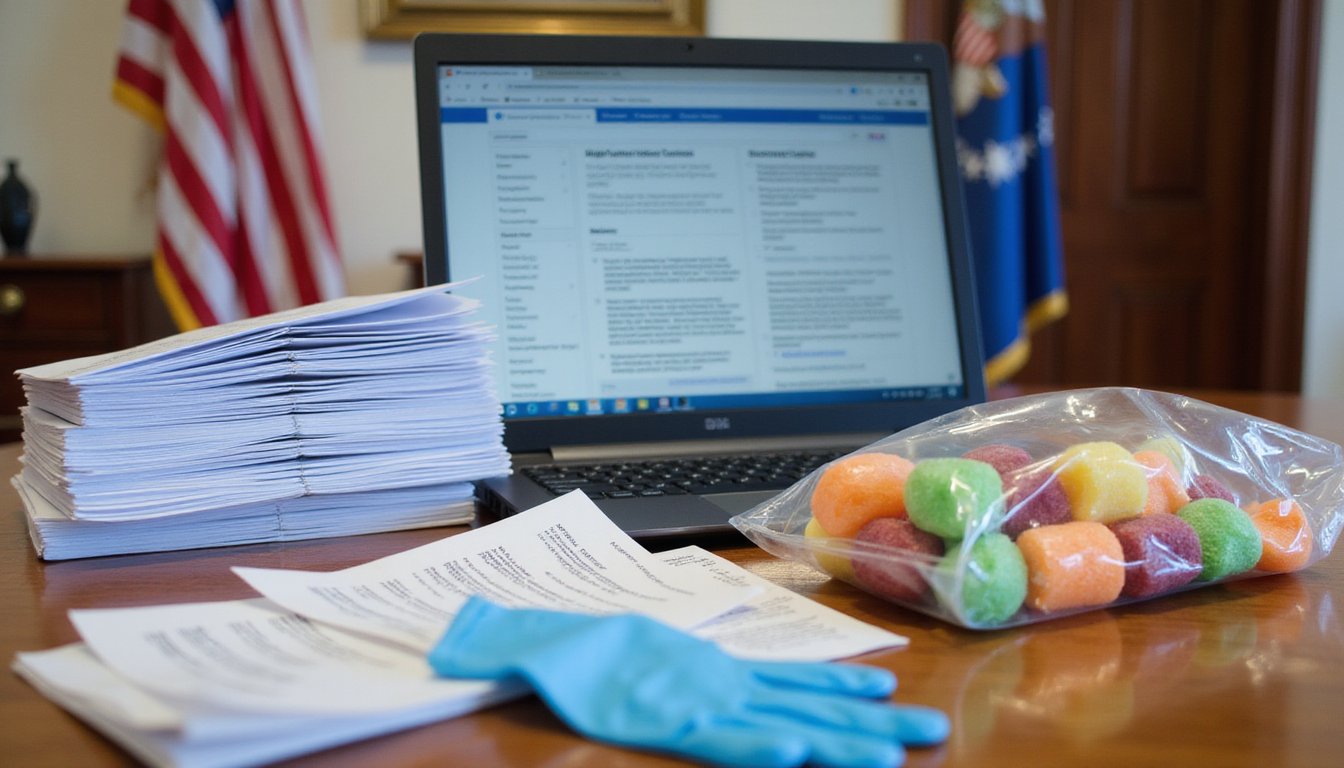Concierge addiction treatment delivers superior recovery outcomes through highly personalized care and advanced monitoring technology. You’ll benefit from individualized programs that combine structured routines, real-time sobriety tracking, and extensive support systems adapted to your specific needs. Research shows that 90+ days of customized treatment drastically improves success rates, while integrated digital solutions and wearable devices certify consistent progress monitoring. Understanding the key components of effective concierge programs will illuminate your path to sustainable recovery.
Understanding the Personalized Care Advantage

While traditional addiction treatment programs often follow standardized protocols, personalized care approaches deliver substantially higher success rates by tailoring interventions to each individual’s unique circumstances. Receiving treatment for 90 days or longer significantly improves recovery outcomes. When you receive individualized care delivery, your treatment team considers your specific history, biology, and co-occurring conditions to create targeted solutions that achieve recovery rates of 40-60%. The incorporation of detailed data collection throughout treatment provides crucial insights for customizing interventions that maximize effectiveness. To maintain the highest level of security and privacy, these facilities implement protective measures similar to those used by leading healthcare websites.
Personalized treatment protocols enable continuous evaluation and modification of your care plan, adapting to your changing needs throughout recovery. You’ll experience higher engagement levels and improved emotional well-being when therapies match your preferences and circumstances. This approach particularly excels in addressing complex cases involving both substance use and mental health challenges. By incorporating genetic assessments, biomarkers, and psychological evaluations, your treatment team can develop precisely targeted interventions that optimize your chances of sustained recovery.
Key Components of At-Home Recovery Programs
The five essential components of at-home recovery programs work synergistically to create an extensive treatment framework that supports sustained sobriety. You’ll find structured daily routines paired with individualized aftercare planning, allowing for recovery program flexibility that adapts to your changing needs. Educational components build critical life skills while therapeutic interventions address underlying issues through evidence-based approaches like CBT and motivational interviewing. A key focus remains on maximizing life functioning through comprehensive support strategies that promote overall wellbeing. Research shows it takes approximately 66 days to establish new recovery habits that become automatic behaviors. Weekly support meetings provide opportunities for clients to take on leadership roles that strengthen their commitment to recovery.
Holistic wellness integration emerges through the combination of spiritual practices, recreational activities, and peer support systems. You’ll access both virtual and in-person counseling, complemented by medical oversight when needed. The program’s success relies on all-encompassing family involvement, ongoing skill development, and connection to community resources – all delivered within a personalized framework that emphasizes accountability while maintaining the comfort of your home environment.
Success Metrics and Treatment Outcomes

Success metrics in addiction recovery encompass multiple quantifiable indicators that paint a thorough picture of treatment effectiveness. You’ll find that longitudinal data analysis reveals varying abstinence rates across substances, with alcohol and amphetamine recovery showing higher success rates (40-41%) compared to opioids and other substances (29-31%). Programs utilize evidence-based practices to maximize positive treatment outcomes. The inherent subjective nature of self-reported progress data presents ongoing measurement challenges. Limited client follow-up after treatment completion remains a significant barrier to comprehensive outcomes reporting.
| Recovery Metric | Measurement Focus |
|---|---|
| Retention Rate | Early engagement success |
| Completion Rate | Treatment adherence |
| Abstinence Rate | Sustained sobriety |
| Risk Reduction | Behavioral improvements |
| Community Reintegration | Social functioning |
Community reintegration metrics track your progress through employment status, educational engagement, and restored relationships. Treatment outcomes aren’t limited to abstinence alone; they include improvements in mental health, decreased emergency department visits, and enhanced quality of life measures. These extensive indicators help determine the effectiveness of your personalized recovery odyssey while identifying areas needing supplementary support.
Advanced Monitoring Technology in Recovery
Advanced monitoring technologies now give you unparalleled insights into your recovery path through real-time sobriety tracking and expansive data gathering. You’ll benefit from wearable devices and smartphone-based systems that continuously monitor physiological markers, behavioral patterns, and environmental triggers while providing immediate feedback and support. Your treatment team can utilize predictive analytics and machine learning to analyze your personal recovery data, enabling early intervention and finely tuned treatment adjustments when needed. The incorporation of secure cloud-based systems ensures your sensitive health data is safely transmitted to healthcare providers for comprehensive monitoring and analysis. Virtual reality environments allow you to practice coping strategies and build resilience in controlled therapeutic settings. The technology enables standardized assessments to be conducted with greater accuracy and reliability across various treatment settings.
Real-Time Sobriety Tracking
Modern real-time sobriety tracking represents a transformative approach to addiction recovery through integrated wearable devices and mobile applications. You’ll find integrated recovery apps and remote recovery coaching now working seamlessly with advanced monitoring technology to provide detailed support for your sobriety journey. Digital therapeutic solutions provide personalized feedback to enhance your individualized treatment plan. Virtual reality simulations help clients practice coping mechanisms in a controlled environment. Ongoing research demonstrates that continuous data collection significantly improves treatment outcomes and enables more effective recovery strategies.
- Wearable devices track your critical signs, sleep patterns, and stress levels in real-time, instantly notifying your support network if concerning patterns emerge
- Transdermal sensors detect alcohol consumption immediately, enabling prompt intervention when needed
- Mobile apps like Nomo and Sober Grid offer daily check-ins and milestone tracking while connecting you to peer support communities
- Machine learning systems analyze your behavioral patterns to identify potential triggers and high-risk situations before they lead to relapse
This data-driven approach guarantees you’re receiving personalized, evidence-based support throughout your recovery process.
Personalized Recovery Data Analysis
The integration of personalized recovery data analysis has revolutionized addiction treatment through sophisticated monitoring systems that process multiple data streams in real-time. Using data-driven personalization and algorithmic treatment selection, you’ll receive precisely tailored interventions based on your unique recovery expedition.
| Data Source | Analysis Method | Clinical Impact |
|---|---|---|
| EHR Records | Predictive Analytics | Treatment Selection |
| Wearable Devices | Machine Learning | Risk Assessment |
| Self-Reports | PITE Analysis | Intervention Timing |
| EMA Data | Statistical Modeling | Progress Tracking |
| Behavioral Metrics | Outcome Monitoring | Plan Adjustment |
Your extensive data profile combines structured clinical information with real-world inputs, enabling more accurate recovery monitoring. Advanced algorithms continuously evaluate treatment effectiveness, analyzing factors like stress levels, social support, and behavioral patterns to predict potential challenges. This complex approach dramatically improves treatment completion rates while allowing for rapid adjustments when needed.
Customized Support Systems and Client Profiles

Professional concierge addiction treatment begins with thorough client profiling to develop customized support systems that align with individual needs and circumstances. Through extensive medical assessments and discreet facility accommodations, you’ll receive tailored care that addresses your unique recovery process.
Professional addiction treatment requires personalized assessment and support, ensuring each client’s journey to recovery matches their individual circumstances.
- Multi-disciplinary evaluations assess your medical history, addiction severity, and co-occurring disorders to create personalized intervention strategies.
- Flexible therapy options combine individual sessions, specialized group work, and holistic treatments matched to your specific needs.
- Round-the-clock support includes certified sober companions and case managers who provide continuous guidance and crisis intervention.
- Private settings and strict confidentiality protocols protect your privacy while maintaining direct access to providers and customized scheduling.
Your treatment plan evolves through ongoing reassessment, ensuring sustained support throughout each recovery phase.
Evidence-Based Benefits of Concierge Models
Research-backed evidence demonstrates the measurable advantages of concierge addiction treatment models across multiple outcome metrics. You’ll find higher completion rates in at-home detox programs compared to traditional inpatient care, while customized care plans lead to improved patient engagement and sustained recovery outcomes.
The data shows that resource accessibility through concierge models directly correlates with augmented treatment success. You’re more likely to benefit from smaller patient-to-provider ratios, allowing for intensive therapeutic focus and immediate crisis response. The evidence supports that these programs deliver superior privacy protection, particularly valuable for high-profile individuals requiring discretion. Cost analyses indicate that despite premium service levels, concierge treatment often proves more economical than traditional inpatient care while yielding higher satisfaction rates and better long-term recovery outcomes.
Long-Term Recovery and Lifestyle Integration
Your long-term recovery success depends on establishing consistent daily routines that support sobriety while building meaningful connections within your support network. You’ll work with your concierge team to develop personalized wellness action plans that incorporate evidence-based lifestyle modifications, including nutrition, exercise, and stress management strategies. These structured approaches, combined with ongoing professional guidance, greatly increase your chances of sustained recovery, as demonstrated by research showing that extensive lifestyle integration leads to better outcomes than treatment alone.
Sustainable Recovery Through Routine
While establishing long-term recovery from addiction requires extensive treatment, maintaining a structured daily routine proves essential for sustainable sobriety. Through consistent daily habit formation and routine-building strategies, you’ll create a foundation that tremendously reduces relapse triggers and strengthens your recovery path.
- Your structured schedule should include fixed times for sleep, meals, and exercise – research shows these basics improve both physical and mental wellness outcomes.
- Implement daily mindfulness practices and therapy appointments to address ongoing mental health needs.
- Engage in meaningful activities that prevent boredom, a known relapse trigger.
- Maintain connections with support groups and treatment professionals who can help adjust your routine as needed.
Statistics show that individuals who maintain structured routines for five years or longer demonstrate significantly higher rates of sustained recovery success.
Building Support Network Connections
Evidence consistently demonstrates that building and maintaining sturdy support networks serves as a cornerstone of successful long-term recovery. Through individual mentorship and alumni network engagement, you’ll access role models with lived recovery experience who can guide your path and reinforce positive behaviors.
Research shows that expanding your recovery-focused connections reduces relapse risk by 7-25%, while 77% of support group participants report improved community connection. You’ll benefit from structured group activities that foster trust and accountability, particularly as you move from formal treatment. Regular participation strengthens your abstinence self-efficacy and provides ongoing motivation.
Consider integrating both peer support groups and community programs into your recovery plan, as data indicate that larger social networks correlate with reduced stress and improved recovery outcomes.
Personalized Wellness Action Plans
Successful long-term recovery depends on developing a thorough, personalized wellness action plan that evolves with your unique needs and circumstances. Through strengths-based goal setting, you’ll establish clear objectives across multidimensional recovery dimensions, including physical health, mental wellness, and social integration.
- Your written plan breaks down long-term recovery into manageable daily tasks while tracking progress through regular assessments
- You’ll develop personalized coping strategies that address your specific triggers and risk factors
- The plan empowers you to actively engage in treatment decisions rather than passively following directions
- Evidence shows that individualized wellness plans improve self-efficacy and fortify overall quality of life
This structured approach guarantees you’re building sustainable recovery habits while maintaining flexibility to adapt as your needs change throughout the recovery voyage.
Frequently Asked Questions
How Do Insurance Companies Typically Cover Concierge Addiction Treatment Programs?
Your insurance will typically cover core medical services like detox and therapy in concierge addiction programs, but you’ll need to examine different coverage options carefully. You’ll pay out-of-pocket for membership fees and luxury amenities, as these aren’t covered by insurance. Financial considerations include higher costs for out-of-network providers and varying levels of coverage based on your plan type. Always verify benefits directly with both your insurer and treatment facility.
What Happens if a Medical Emergency Occurs During At-Home Treatment?
If you experience a medical emergency during at-home treatment, your care team will immediately activate established medical emergency protocols. They’ll assess your condition and contact emergency medical services if needed. Your provider’s hospital response procedures include coordinating with local EDs for rapid transfer and providing critical medical information. You’ll have access to emergency medications under supervision, and your care team will maintain communication with emergency responders throughout the crisis.
Can Family Members Participate in the Treatment Process?
Yes, you can and should include your family in your recovery trip. Active family involvement is a vital component of successful treatment outcomes. You’ll participate in therapeutic family sessions that improve communication, rebuild trust, and address enabling behaviors. Your family members will receive education about addiction, learn supportive strategies, and develop skills to help maintain your sobriety. They’ll also get support for their own emotional well-being throughout the process.
How Are Medications Managed and Monitored in At-Home Recovery Programs?
Your medications will be closely monitored through regular telemedicine check-ins and digital tracking systems. You’ll participate in structured medication management groups and follow a personalized dosing schedule supervised by your physician. Medication adherence is tracked through digital pill dispensers and check-in apps, while dosage adjustments are made based on your progress and needs. Remote case managers coordinate your care, ensuring you’re following the prescribed regimen and addressing any concerns promptly.
What Qualifications Do Concierge Addiction Treatment Providers Need to Have?
You’ll need providers with extensive medical and clinical credentials, including state licensure and board certification in addiction medicine. Your treatment team should have advanced degrees (MD, DO, PhD) and specialized certifications for developing customized recovery plans. Personal recovery coaches must complete at least 6,000 hours of supervised experience, while medical professionals require ongoing education credits. All providers must maintain HIPAA compliance and demonstrate expertise in coordinating holistic care across multiple disciplines.





